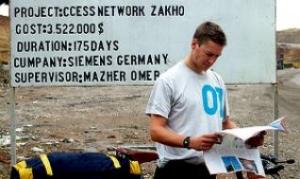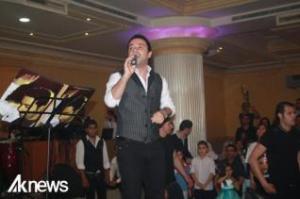
Welcome to Iraqi Kurdistan

In December last year Alex Kelly and his friend Ed Crosthwaite-Eyre rode their bicycles across Iraqi Kurdistan. Expecting to bear witness to the dispiriting aftermath of Saddam Hussein's regime, during which hundreds of thousands of Kurds were killed, they were startled by the friendly enthusiasm with which they were met.
Welcomed by gift-bearing policemen and chaperoned by a series of television crews, both cyclists left the country with significantly different ideas about it than when they arrived
My friend Ed and I only had one contact in Iraqi Kurdistan. Mohammed Hassan is a friend of a friend of a friend. He's the chief of prisons in Dohuk, the third biggest town in the autonomous region.
Mohammed greeted us at the Dohuk police station. He had the grizzled look of the peshmerga (Kurdish for "those who face death"), the guerrillas who fought Saddam Hussein. He was wearing uniform and stood in front of seven men holding Kalashnikovs. Ed and I were wearing lycra and stood by our bicycles.
I realised at that moment that the situation was out of my control. Maybe Iraqi Kurdistan was not, after all, an appropriate holiday destination for Ed, 24, a trainee solicitor, and me, 23, a newly qualified teacher. We should have taken our bicycles to the south of France. Then Mohammed smiled and walked towards us with his arms opened wide; he greeted us like long lost sons.
He took us to the Motel Jamil which had deep sofas and satellite television. We told him that we were worried we couldn't afford it. Mohammed choked, shocked that the thought had entered our heads. He said that we were guests in Kurdistan and he would be ashamed if we paid.
Next, he took us out for lunch. This was a barrel-shaped wrap containing rice, chicken, lamb and spices. "This is kos-i," said Mohammed proudly. "It's Kurdish." Ed said he liked Mohammed's watch; after lunch Mohammed bought us one each from Dohuk market.
Then he took us to a sports shop. "What do you like?" In turn, he held up Manchester United jumpsuits, Nike trainers, Wayne Rooney hoodies. He chased us around the shop holding a Cristiano Ronaldo T-shirt.
We thought we'd got away. We were wrong. Back at the police station Mohammed's boss, a two star general, gave us a Kurdistan football strip each. We finished the day sitting in the general's oak-panelled office with his uniformed entourage; we were wearing budgerigar yellow Kurdistan football strips and our new watches.
The next morning we were on television. Aram Sivan, from Kurdistan Television, asked how many kilometres we cycled a day, and how many kilometres we'd cycled in total since beginning in the south of Iran two months ago. I bigged us up, a little.
Then he asked, why did you choose to visit Kurdistan? What do you think of the road system? What do you think of the Kurdish people? How does Kurdistan compare to England? What are you going to tell people about Kurdistan when you get home?
The interview was set up in the car park of Mohammed's police station. We were watched by a small crowd of policemen carrying automatic weapons; we felt a certain pressure to say nice things about Kurdistan.
I said that I was impressed by the new buildings in Dohuk. It's true, I really was surprised. Instead of war-remains, I found new offices, government ministries, hotels with names like The Plaza and Sunshine. I was also impressed by the people we had met. Mohammed, chief of prisons, is also a law student. Mohammed's sergeant, Jamal Husain, studies business and management. They couldn't study before because they were fighting Saddam Hussein.
Then, setting a pattern for the rest of our trip across Iraqi Kurdistan, Aram Sivan and his cameraman took us out for dinner.
Ed and I became a baton for Kurdish television channels. We cycled east. At each town a new channel picked us up and passed us on to the next. When we saw a TV crew waiting for us at the top of a hill we would wonder: "Hmm, what are we getting for dinner?"
All the same, after nine days we ran out of cash. The ATMs didn't accept visa cards. In the eastern city of Sulemaniya we met the chief executive of Kurdistan's newest satellite channel, Kurdistan-G. When he found out we were short of money he gave us US$250. He refused to give us his bank details, saying he didn't want us to pay him back.
In Sulemaniya, we visited the "Red House". Saddam's regime used this building as a place of torture and execution. The many small cells are windowless. One, the "children's room", is where the very young were imprisoned. Drawings are scratched on the walls. It was dark, but we could make out a figure with impossible muscles, wearing a mask and a cape. He looked like an American cartoon superhero, something from The Incredibles. Also, he looked like an executioner.
Ed and I left the region materially richer than when we'd arrived. The hospitality of the Iraqi Kurds went beyond the celebrated Arabic generosity we had enjoyed elsewhere in the Middle East.
The Kurds are the largest ethnic group without a nation of their own. About 30 million of them live in a contiguous region that includes land in Iraq, Syria, Turkey, and Iran. They have an old saying that Kurds "have no friends but the mountains". The excellent meals and Ronaldo T-shirts may have been a small part of a design to change that.
They set out to turn us into friends for their new country – and they did. I was won over by their generosity and aspiration against the backdrop of a horrific past. When I left I felt the sense of inspiration particular to a country that is whole-heartedly creating itself.
guardian.co.uk
- Add new comment
- 4863 reads


